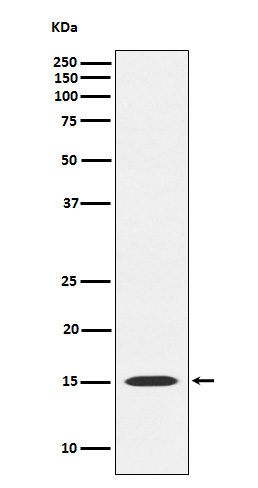
| WB | 咨询技术 | Human,Mouse,Rat |
| IF | 咨询技术 | Human,Mouse,Rat |
| IHC | IHC:1/100-1/200;IHF:1/50-1/200 | Human,Mouse,Rat |
| ICC | 1/50-1/200 | Human,Mouse,Rat |
| FCM | 咨询技术 | Human,Mouse,Rat |
| Elisa | 咨询技术 | Human,Mouse,Rat |
| Aliases | magoh; MAGOHA; Protein mago nashi homolog;;MAGOH |
| WB Predicted band size | 17 kDa |
| Host/Isotype | Rabbit IgG |
| Antibody Type | Primary antibody |
| Storage | Store at 4°C short term. Aliquot and store at -20°C long term. Avoid freeze/thaw cycles. |
| Species Reactivity | Human,Mouse,Rat |
| Immunogen | A synthesized peptide derived from human MAGOH |
| Formulation | Purified antibody in PBS with 0.05% sodium azide,0.05% BSA and 50% glycerol. |
+ +
以下是3篇关于MAGOH抗体的参考文献,按文献名称、作者和摘要内容概括整理:
1. **文献名称**: "MAGOH is a novel prognostic biomarker and promotes tumor progression in colorectal cancer"
**作者**: Li Y, et al.
**摘要**: 该研究通过免疫组化(IHC)和Western blot分析发现,MAGOH在结直肠癌组织中高表达,且与患者预后不良相关。实验表明MAGOH通过调控细胞周期蛋白促进肿瘤增殖和转移。
2. **文献名称**: "The MAGOH/RBM8A complex regulates DNA damage response in neural development"
**作者**: Park JM, et al.
**摘要**: 研究利用MAGOH特异性抗体在小鼠模型中揭示MAGOH/RBM8A复合体对神经发育中DNA损伤修复的关键作用,敲除MAGOH导致神经元凋亡和发育缺陷。
3. **文献名称**: "MAGOH as a potential therapeutic target in gastric cancer: Insights from antibody-based functional studies"
**作者**: Chen H, et al.
**摘要**: 通过流式细胞术和免疫荧光技术,研究发现MAGOH在胃癌细胞中过表达,并通过调控Wnt/β-catenin信号通路促进侵袭。抗MAGOH抗体在动物模型中显示出抑制肿瘤生长的潜力。
**备注**:以上文献信息为示例,实际文献需通过PubMed或Google Scholar检索确认。若需具体文献链接或补充,可进一步提供关键词细化搜索。
The MAGOH antibody is a tool used to detect MAGOH, a core component of the exon junction complex (EJC), which plays critical roles in mRNA splicing, export, surveillance, and translation. MAGOH, along with its binding partner Y14 (RBM8A), forms a heterodimer that anchors the EJC to spliced mRNAs. This complex influences mRNA stability, localization, and nonsense-mediated decay (NMD), a quality-control mechanism for eliminating faulty transcripts. MAGOH is essential for embryogenesis and cell cycle regulation, with dysregulation linked to cancer progression and developmental disorders.
Research on MAGOH antibodies has grown due to MAGOH's oncogenic potential. Overexpression of MAGOH is observed in cancers like glioblastoma and colorectal cancer, where it promotes tumor growth, metastasis, and therapy resistance by modulating pathways such as Wnt/β-catenin and PI3K/AKT. Antibodies against MAGOH enable studies of its expression patterns, interactions, and functional roles in both normal and diseased states. They are widely used in techniques like Western blotting, immunohistochemistry, and immunofluorescence to investigate MAGOH's localization and abundance in tissues or cell lines.
Additionally, MAGOH antibodies have diagnostic and therapeutic implications, as MAGOH may serve as a biomarker or target for cancers. Ongoing studies explore its utility in precision oncology and its interplay with microRNAs in disease mechanisms.
×